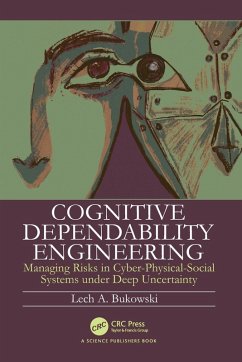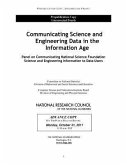Lech Bukowski
Cognitive Dependability Engineering
Managing Risks in Cyber-Physical-Social Systems under Deep Uncertainty
Lech Bukowski
Cognitive Dependability Engineering
Managing Risks in Cyber-Physical-Social Systems under Deep Uncertainty
- Broschiertes Buch
- Merkliste
- Auf die Merkliste
- Bewerten Bewerten
- Teilen
- Produkt teilen
- Produkterinnerung
- Produkterinnerung
The book presents the theoretical basis of Cognitive Dependability Engineering, and on this basis proposes a methodology of decision-making in Cyber-Physical-Social Systems in conditions of risk and uncertainty.
Andere Kunden interessierten sich auch für
![Sleight of Mouth Sleight of Mouth]() Robert DiltsSleight of Mouth23,99 €
Robert DiltsSleight of Mouth23,99 €![The Information Revolution The Information Revolution]() Alan PorterThe Information Revolution66,99 €
Alan PorterThe Information Revolution66,99 €![Longitudinal Models in the Behavioral and Related Sciences Longitudinal Models in the Behavioral and Related Sciences]() Longitudinal Models in the Behavioral and Related Sciences76,99 €
Longitudinal Models in the Behavioral and Related Sciences76,99 €![Sport 2.0 Sport 2.0]() Andy MiahSport 2.026,99 €
Andy MiahSport 2.026,99 €![Geometric and Topological Inference Geometric and Topological Inference]() Jean-Daniel BoissonnatGeometric and Topological Inference48,99 €
Jean-Daniel BoissonnatGeometric and Topological Inference48,99 €![Communicating Science and Engineering Data in the Information Age Communicating Science and Engineering Data in the Information Age]() National Research CouncilCommunicating Science and Engineering Data in the Information Age37,99 €
National Research CouncilCommunicating Science and Engineering Data in the Information Age37,99 €![The Intelligent Citizen's Guide to Risks in Financial Institutions The Intelligent Citizen's Guide to Risks in Financial Institutions]() Mark J. DoughertyThe Intelligent Citizen's Guide to Risks in Financial Institutions43,99 €
Mark J. DoughertyThe Intelligent Citizen's Guide to Risks in Financial Institutions43,99 €-
-
-
The book presents the theoretical basis of Cognitive Dependability Engineering, and on this basis proposes a methodology of decision-making in Cyber-Physical-Social Systems in conditions of risk and uncertainty.
Produktdetails
- Produktdetails
- Verlag: Taylor & Francis Ltd (Sales)
- Seitenzahl: 302
- Erscheinungstermin: 19. Dezember 2024
- Englisch
- Abmessung: 234mm x 156mm x 17mm
- Gewicht: 458g
- ISBN-13: 9781032486178
- ISBN-10: 1032486171
- Artikelnr.: 72111583
- Herstellerkennzeichnung
- Libri GmbH
- Europaallee 1
- 36244 Bad Hersfeld
- gpsr@libri.de
- Verlag: Taylor & Francis Ltd (Sales)
- Seitenzahl: 302
- Erscheinungstermin: 19. Dezember 2024
- Englisch
- Abmessung: 234mm x 156mm x 17mm
- Gewicht: 458g
- ISBN-13: 9781032486178
- ISBN-10: 1032486171
- Artikelnr.: 72111583
- Herstellerkennzeichnung
- Libri GmbH
- Europaallee 1
- 36244 Bad Hersfeld
- gpsr@libri.de
Lech A. Bukowski is a professor of Management Engineering at WSB University, D¿browa Górnicza, Poland. He obtained a PhD (1976) and DSc (1990) from the AGH University of Science and Technology Cracow and became a Professor of Engineering in 1998. He became a Professor Honoris Causa in the Technical University Clausthal (Germany) in 2003. He is an active member of the scientific committees of many international conferences (e.g., honorary chairman of the Carpathian Logistics Congress), he is on the editorial board of 5 scientific periodicals, and a member of the Siemens Award Chapter. His professional career which began in 1966, includes "Azoty Tarnów" (chemicals manufacturer) in and "Nowa Huta" (metals manufacturer) in Cracow. His foray in includes being academia, lecturer at the AGH University of Science and Technology in Cracow (1976); an Assistant Professor at the Technical University Clausthal in Germany (1981 to 1987). He was the Head of Department for Systems Quality and Reliability (1994 to 2003), and from 2003 to 2013 he was in the Faculty of Management, AGH University as a Head of the Systems Engineering Chair, and a Dean of the Faculty. He has been Director, Business Engineering Center at WSB University since 2013. His interests include Systems Science, especially Systems Engineering, and Industrial Logistics. He has published more than 230 scientific papers and has authored 12 monographs in Polish, English and German and has six patents.
Preface. Introduction. PART I. DEVELOPMENT OF SYSTEMS ENGINEERING CONCEPTS:
FROM SINGLE SYSTEMS ENGINEERING TO COGNITIVE SYSTEMS ENGINEERING. Basics of
Systems Science. Systems Engineering. System of Systems Engineering.
Cognitive Systems Engineering. PART II. CONCEPTS OF ATTRIBUTE-ORIENTED
SYSTEMS ENGINEERING: FROM RELIABILITY ENGINEERING TO COGNITIVE
DEPENDABILITY ENGINEERING. Reliability Engineering: The Concept of
Failure-free Operation. Safety Engineering: The Concept of Effective
Protection. Security Engineering: The Concept of Cyber-security. Resilience
Engineering: The Concept of Process Continuity. Dependable Computing: The
Concept of Fault-tolerant Functioning. Cognitive Dependability Engineering:
The concept of Trustworthy Performance. PART III. MODELLING AND SIMULATION
THE OPERATION OF CYBER-PHYSICAL-SOCIAL SYSTEMS IN A RISKY ENVIRONMENT.
Methodology of Modelling and Simulation Used for Complex Systems. Modelling
of Cyber-Physical-Social Systems. Simulation of Cyber-Physical-Social
Systems Behaviour in a Risky Environment. PART IV. MANAGING RISKS IN
CYBER-PHYSICAL-SOCIAL SYSTEMS UNDER DEEP UNCERTAINTY. Uncertainty-oriented
Concepts of Decision-making. Cognitive Dependability-based Problem-solving
in Cyber-Physical-Social Systems Operating under Deep Uncertainty.
Application Examples: Lesson Learned from Case Studies. Summary and
Concluding Considerations. Glossary. Index.
FROM SINGLE SYSTEMS ENGINEERING TO COGNITIVE SYSTEMS ENGINEERING. Basics of
Systems Science. Systems Engineering. System of Systems Engineering.
Cognitive Systems Engineering. PART II. CONCEPTS OF ATTRIBUTE-ORIENTED
SYSTEMS ENGINEERING: FROM RELIABILITY ENGINEERING TO COGNITIVE
DEPENDABILITY ENGINEERING. Reliability Engineering: The Concept of
Failure-free Operation. Safety Engineering: The Concept of Effective
Protection. Security Engineering: The Concept of Cyber-security. Resilience
Engineering: The Concept of Process Continuity. Dependable Computing: The
Concept of Fault-tolerant Functioning. Cognitive Dependability Engineering:
The concept of Trustworthy Performance. PART III. MODELLING AND SIMULATION
THE OPERATION OF CYBER-PHYSICAL-SOCIAL SYSTEMS IN A RISKY ENVIRONMENT.
Methodology of Modelling and Simulation Used for Complex Systems. Modelling
of Cyber-Physical-Social Systems. Simulation of Cyber-Physical-Social
Systems Behaviour in a Risky Environment. PART IV. MANAGING RISKS IN
CYBER-PHYSICAL-SOCIAL SYSTEMS UNDER DEEP UNCERTAINTY. Uncertainty-oriented
Concepts of Decision-making. Cognitive Dependability-based Problem-solving
in Cyber-Physical-Social Systems Operating under Deep Uncertainty.
Application Examples: Lesson Learned from Case Studies. Summary and
Concluding Considerations. Glossary. Index.
Preface. Introduction. PART I. DEVELOPMENT OF SYSTEMS ENGINEERING CONCEPTS:
FROM SINGLE SYSTEMS ENGINEERING TO COGNITIVE SYSTEMS ENGINEERING. Basics of
Systems Science. Systems Engineering. System of Systems Engineering.
Cognitive Systems Engineering. PART II. CONCEPTS OF ATTRIBUTE-ORIENTED
SYSTEMS ENGINEERING: FROM RELIABILITY ENGINEERING TO COGNITIVE
DEPENDABILITY ENGINEERING. Reliability Engineering: The Concept of
Failure-free Operation. Safety Engineering: The Concept of Effective
Protection. Security Engineering: The Concept of Cyber-security. Resilience
Engineering: The Concept of Process Continuity. Dependable Computing: The
Concept of Fault-tolerant Functioning. Cognitive Dependability Engineering:
The concept of Trustworthy Performance. PART III. MODELLING AND SIMULATION
THE OPERATION OF CYBER-PHYSICAL-SOCIAL SYSTEMS IN A RISKY ENVIRONMENT.
Methodology of Modelling and Simulation Used for Complex Systems. Modelling
of Cyber-Physical-Social Systems. Simulation of Cyber-Physical-Social
Systems Behaviour in a Risky Environment. PART IV. MANAGING RISKS IN
CYBER-PHYSICAL-SOCIAL SYSTEMS UNDER DEEP UNCERTAINTY. Uncertainty-oriented
Concepts of Decision-making. Cognitive Dependability-based Problem-solving
in Cyber-Physical-Social Systems Operating under Deep Uncertainty.
Application Examples: Lesson Learned from Case Studies. Summary and
Concluding Considerations. Glossary. Index.
FROM SINGLE SYSTEMS ENGINEERING TO COGNITIVE SYSTEMS ENGINEERING. Basics of
Systems Science. Systems Engineering. System of Systems Engineering.
Cognitive Systems Engineering. PART II. CONCEPTS OF ATTRIBUTE-ORIENTED
SYSTEMS ENGINEERING: FROM RELIABILITY ENGINEERING TO COGNITIVE
DEPENDABILITY ENGINEERING. Reliability Engineering: The Concept of
Failure-free Operation. Safety Engineering: The Concept of Effective
Protection. Security Engineering: The Concept of Cyber-security. Resilience
Engineering: The Concept of Process Continuity. Dependable Computing: The
Concept of Fault-tolerant Functioning. Cognitive Dependability Engineering:
The concept of Trustworthy Performance. PART III. MODELLING AND SIMULATION
THE OPERATION OF CYBER-PHYSICAL-SOCIAL SYSTEMS IN A RISKY ENVIRONMENT.
Methodology of Modelling and Simulation Used for Complex Systems. Modelling
of Cyber-Physical-Social Systems. Simulation of Cyber-Physical-Social
Systems Behaviour in a Risky Environment. PART IV. MANAGING RISKS IN
CYBER-PHYSICAL-SOCIAL SYSTEMS UNDER DEEP UNCERTAINTY. Uncertainty-oriented
Concepts of Decision-making. Cognitive Dependability-based Problem-solving
in Cyber-Physical-Social Systems Operating under Deep Uncertainty.
Application Examples: Lesson Learned from Case Studies. Summary and
Concluding Considerations. Glossary. Index.









